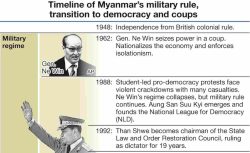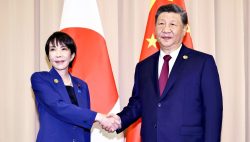15:58 JST, February 7, 2024
A situation must be avoided in which information about advanced technology related to Japan’s security and other matters is stolen by other countries or leaked to foreign nations.
The government intends to establish a security clearance system to authorize civil servants and company employees to handle classified information. A bill to establish this system will be submitted to the Diet in the near future.
In Western nations, advanced civilian technologies such as cyber-related technologies and artificial intelligence have also been used for military purposes. Each country designates which government employees and civilians have access to important information, to prevent the leakage of sensitive information.
In Japan, the Law on the Protection of Specially Designated Secrets was enacted in 2013 to protect sensitive information in the four fields of defense, diplomacy, anti-espionage and terrorism prevention. However, there is no system to guard economic information.
The new legislation will put in place a system similar to those in Western nations and require confidentiality from those who will be authorized to access important information. If the new system is realized, the degree of trust in Japanese companies will increase and the smooth sharing of information with relevant countries will be promoted.
To protect sensitive information, the government plans to examine criminal records, financial status and other background information of civil servants and private citizens under the security clearance system. If there are no problems, the government will authorize them to handle sensitive information. The consent of the individuals involved will be required when conducting these background checks.
In descending order of importance, sensitive information is classified as “top secret,” “secret” and “confidential.” Civil servants and some private citizens who are qualified under the Law on the Protection of Specially Designated Secrets are allowed to handle top secret and secret information. However, under the new legislation that will cover confidential information, most of the people who will be authorized to handle such information are expected to be private citizens.
The penalty for leaking information is up to 10 years of imprisonment with labor for violations of the Law on the Protection of Specially Designated Secrets, compared to up to five years of imprisonment with labor and other penalties for violations of the new legislation. It can be said that the difference in the punishment reflects the relative importance of the information.
At the same time, there are many points to keep in mind when formulating the new legislation.
Many people are probably concerned that government background checks could infringe on the privacy of examinees. There are also fears that those who do not qualify to handle such information as a result of the background checks may find it difficult to stay at their workplace.
To avoid such a situation, the government plans to allow those who feel they have been treated unfairly in the background checks to file a complaint. The government should not only stipulate this in the new legislation, but also continue its efforts to deepen companies’ understanding.
In addition, there are concerns that qualified civilians would be more restrained than necessary and would feel like they should not give interviews to the media about non-sensitive information. The government intends to clearly stipulate in the new legislation provisions regarding freedom of the press and news coverage. However, sufficient care must be taken so that the public’s right to know is not impeded.
(From The Yomiuri Shimbun, Feb. 7, 2024)
Top Articles in Editorial & Columns
-

Myanmar Will Continue Under Military Rule Even After Election, Ex-Ambassador Maruyama Says in Exclusive Interview
-

40 Million Foreign Visitors to Japan: Urgent Measures Should Be Implemented to Tackle Overtourism
-

Expansion of New NISA: Devise Ways to Build up Household Assets
-

China Criticizes Sanae Takaichi, but China Itself Is to Blame for Worsening Relations with Japan
-

Withdrawal from International Organizations: U.S. Makes High-handed Move that Undermines Multilateral Cooperation
JN ACCESS RANKING
-

Univ. in Japan, Tokyo-Based Startup to Develop Satellite for Disaster Prevention Measures, Bears
-

JAL, ANA Cancel Flights During 3-day Holiday Weekend due to Blizzard
-

China Confirmed to Be Operating Drilling Vessel Near Japan-China Median Line
-

China Eyes Rare Earth Foothold in Malaysia to Maintain Dominance, Counter Japan, U.S.
-

Japan Institute to Use Domestic Commercial Optical Lattice Clock to Set Japan Standard Time



















